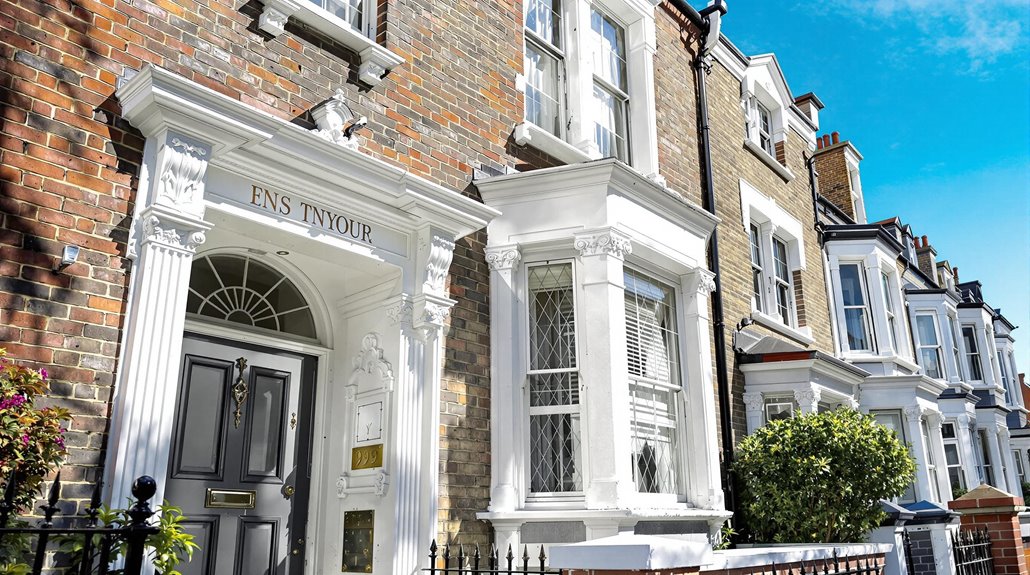I’ve encountered countless property buyers who assume a 999-year lease offers identical benefits to freehold ownership, but that’s not entirely accurate. While you’ll gain substantial long-term security and avoid the typical lease extension headaches, there are essential differences that could impact your investment returns and property rights. The financial implications alone can shift your overall ownership costs by thousands of pounds, and understanding these distinctions will determine whether you’re making a smart purchase or overlooking better alternatives.
Key Takeaways
- A 999-year lease functions as “virtual freehold” with near-permanent security and increases property value by 5-7%.
- Unlike freehold, 999-year leases require freeholder consent for modifications and involve ongoing service charge obligations.
- Freehold offers complete ownership control and higher resale values, while 999-year leases provide lower entry costs.
- Both attract mortgage lenders equally, but freehold properties may have slight market preference among some buyers.
- Recent leasehold reforms enhance 999-year lease security, making them increasingly comparable to freehold ownership benefits.
Understanding Property Ownership Types in the UK
Understanding property ownership in the UK requires grasping five fundamental structures that determine your legal rights and responsibilities. I’ll break down each type so you can navigate property decisions confidently.
Sole ownership means you’re the single legal owner with complete control over the property. As the sole owner, you bear complete financial liability for all debts secured against the property. Additionally, maintaining your property effectively can enhance its value, much like how deadheading lupins promotes more blooms in gardening.
Joint ownership splits between joint tenancy, where you and co-owners have equal rights with automatic inheritance, and tenants in common, where you own distinct transferable shares.
Freehold ownership gives you permanent ownership of both property and land indefinitely. Leasehold ownership grants temporary rights for a specific period under lease terms. Shared freehold occurs when leaseholders collectively purchase the freehold together, combining individual flat ownership with group building control.
Each structure affects your property rights, responsibilities, and future options differently.
What Exactly Is a 999-Year Lease?
When you encounter a 999-year lease, you’re looking at the longest possible leasehold term available in UK property law. This leasehold interest fundamentally functions as permanent ownership during your lifetime and several generations beyond.
Under historic common law, this lease type emerged in Britain and Commonwealth countries as the maximum duration legally permissible. You’ll find it’s often called a “virtual freehold” because the practical implications mirror outright ownership. This type of ownership provides individual control over the property, similar to that of freeholders.
Unlike shorter leases requiring costly extensions, you won’t face lease decay concerns or complicated freeholder negotiations. The ground rent typically remains nominal—sometimes just a peppercorn. While you don’t technically own the land, you’ll have substantial control over improvements and modifications.
These leases are often utilized for significant land transactions and major development projects due to their quasi-permanent nature.
Lenders and buyers view these properties favorably, making them highly marketable investments that avoid the complexities plaguing shorter-term leaseholds.
Key Advantages of Choosing a 999-Year Lease

Although 999-year leases require careful consideration like any property investment, they offer compelling advantages that make them increasingly attractive to UK property buyers. I’ve found they typically increase your property’s market value by 5-7% while costing less than purchasing the freehold outright. Additionally, many sellers can minimize estate agent fees by opting for alternative selling methods, further enhancing the financial benefits of a 999-year lease.
You’ll enjoy near-permanent security without worrying about lease expiration during your lifetime. The ground rent becomes nominal—often just a peppercorn—eliminating those escalating annual payments that plague shorter leases.
Your property becomes considerably more marketable and mortgageable, appealing to both buyers and lenders who view 999-year terms as practically equivalent to freehold ownership. You’ll avoid future lease extension hassles and costs while gaining greater control over property modifications. A 999-year lease represents the maximum length available for leasehold properties in the UK. It’s fundamentally freehold benefits at leasehold prices.
Limitations and Drawbacks of Long-Term Leases
Despite their considerable advantages, 999-year leases carry inherent limitations that you can’t simply wish away through contract length. You’ll still lack ultimate ownership control, requiring freeholder consent for structural changes or subletting decisions. This creates frustrating bottlenecks when you want to renovate or generate rental income.
Service charges remain mandatory, and you can’t control these escalating costs independently. I’ve seen leaseholders shocked by unexpected administrative fees for basic consents. Pet ownership, home businesses, and property modifications often require approval, limiting your lifestyle choices. It’s also important to note that these service charges can significantly affect your overall financial planning, as hidden costs associated with leasehold flats can add up over time.
The resale market perception matters too – some buyers instinctively prefer freehold properties, potentially affecting your property’s marketability. Legal disputes over service charges or building maintenance can become expensive headaches requiring collective leaseholder action to resolve effectively. Fortunately, leaseholders can pursue collective enfranchisement to purchase the freehold together, giving them greater control over their property’s future.
Since property tenure directly impacts your wallet both today and decades ahead, understanding the financial implications of 999-year leases versus freehold ownership becomes essential for informed decision-making.
I’ve found that while freehold properties demand higher upfront costs, they eliminate ongoing ground rent and service charges that leasehold owners face. You’ll pay more initially, but you’re buying freedom from future obligations. With 999-year leases, you’ll secure lower entry costs but accept perpetual service charges and ground rent payments. Utilizing a estate agent fees calculator can further assist in estimating potential costs when selling your property.
From a resale perspective, freeholds consistently achieve higher values and attract more buyers seeking ownership clarity. However, 999-year leases maintain stable value without the depreciation concerns affecting shorter leases. Your mortgage options remain similar for both, though freeholds offer unrestricted development potential that leaseholds can’t match. Freehold owners carry full maintenance responsibility for their properties, while leaseholders typically face limited maintenance obligations.
Legal Rights and Restrictions Under Extended Leases
When you hold a 999-year lease, you’ll gain substantial statutory rights that protect your interests while accepting specific restrictions that govern your property use. Estate agents are obligated to provide accurate information about the lease terms, ensuring that you are fully informed before making your purchase.
Your extended lease maintains all original covenants—service charges, repair obligations, and use restrictions remain unchanged. I’ve seen leaseholders surprised that extending doesn’t eliminate these responsibilities. The freeholder retains enforcement rights for covenant breaches, so you’re still accountable for lease compliance.
However, you can negotiate variations to problematic terms. If your lease contains defective provisions causing hardship, you can apply to a tribunal for modifications. Common variations include adjusting service charge calculations or repair responsibilities. Under recent reforms, you can also challenge your landlord’s legal costs when pursuing these variations or other lease-related matters.
Remember that any agreed variations must be registered with Land Registry to bind future owners. This protects your investment and guarantees continuity for subsequent purchasers within our property-owning community. Understanding your rights as a buyer can significantly enhance your negotiating power and help you navigate the complexities of lease agreements.
Impact of Recent Leasehold Reforms on Long-Term Leases
Recent leasehold reforms have fundamentally altered the landscape for 999-year lease holders, creating both immediate opportunities and strategic considerations you’ll need to navigate. The abolition of the two-year ownership rule from 31 January 2025 means you can now act immediately on problematic lease terms without waiting periods. More notably, standardized 990-year extensions with zero ground rent offer enhanced security, though they don’t quite match your existing 999-year term. It’s important to stay compliant with approved planning permissions as these changes unfold, ensuring that you avoid potential future penalties.
The ground rent regulation and forfeiture ban provides essential protection against freeholder exploitation – something that’s particularly relevant for ultra-long leases where disputes can span decades. These reforms also mandate increased transparency requirements for service charges, administration charges, and building insurance fees, giving leaseholders better oversight of their ongoing costs. While the upcoming commonhold system offers an alternative path to freehold-equivalent ownership, implementation delays until 2026 mean you’ll need to assess whether your current 999-year lease already meets your long-term security needs.
Market Value and Resale Considerations
Three key factors drive the superior market positioning of 999-year leases: immediate value premium, long-term security, and buyer confidence. You’ll see a 5-7% value boost compared to shorter leases, positioning your property alongside freehold investments regarding long-term retention.
I’ve found that buyers actively seek these extended leases because they eliminate the “hard to sell” stigma that kicks in below 80 years. You won’t face lease-length barriers when selling, and you’ll attract risk-averse purchasers who value near-freehold security. Unlike 125-year leases that create complications in selling as the term shortens, 999-year leases maintain their market appeal consistently throughout their duration. Additionally, understanding the hidden costs associated with leasehold properties can further enhance your investment’s attractiveness.
The financing advantages are substantial—lenders classify these as secure collateral, offering higher loan-to-value ratios and smoother mortgage approvals. You’re fundamentally buying into a premium market segment that maintains indefinite marketability while avoiding the depreciation risks that plague standard leasehold properties.
Making the Right Choice for Your Property Investment

Although 999-year leases offer compelling advantages, your investment decision ultimately hinges on balancing ownership control against financial accessibility. I recommend choosing freehold if you’re planning long-term ownership and value complete autonomy over property decisions. You’ll avoid ongoing ground rent obligations and freeholder dependencies, though you’ll face higher upfront costs. The recent Leasehold Reform Act 2025 has also made it easier for leaseholders to extend their leases and manage their properties more effectively.
Consider a 999-year lease when budget constraints limit your freehold options or you’re investing in flats where leasehold’s standard. You’ll benefit from lower entry costs while securing generational security without lease-expiry concerns. Remember that leaseholders have rights to manage disputes with freeholders and can request transparency on service charge expenditures.
Evaluate your risk tolerance carefully. If you prefer minimizing third-party relationships and want maximum flexibility for renovations or quick sales, freehold’s your best choice. However, if you’re comfortable with lease terms and prioritize affordability, 999-year leases provide excellent value.
Conclusion
I’d recommend evaluating your specific circumstances before choosing. If you’re seeking maximum control and long-term investment security, freehold remains superior despite higher upfront costs. However, if you’re prioritizing affordability while maintaining reasonable security, a 999-year lease offers solid value with minimal ground rent obligations. Consider your renovation plans, service charge tolerance, and exit strategy. Don’t overlook upcoming leasehold reforms that’ll further strengthen your position as a long-term leaseholder.
References
- https://www.moneyhelper.org.uk/en/homes/buying-a-home/leasehold-vs-freehold-whats-the-difference
- https://www.comparemymove.com/guides/conveyancing/999-year-lease
- https://www.unbiased.co.uk/discover/mortgages-property/ownership-improvements/leasehold-vs-freehold-what-s-the-difference
- https://www.bishopslaw.co.uk/999-year-lease-vs-freehold/
- https://www.uswitch.com/mortgages/leasehold-vs-freehold/
- https://www.ellisandco.co.uk/guides/buying/types-of-homeownership-8240/
- https://hyperjar.com/blog/types-of-property-ownership
- https://propertyregistry.uk/different-types-of-property-ownership-structures/
- https://uklandlordtax.co.uk/tax-guide/types-of-ownership/
- https://www.athilaw.co.uk/post/understanding-freehold-and-leasehold-property-ownership-in-the-uk-key-differences-and-implications

